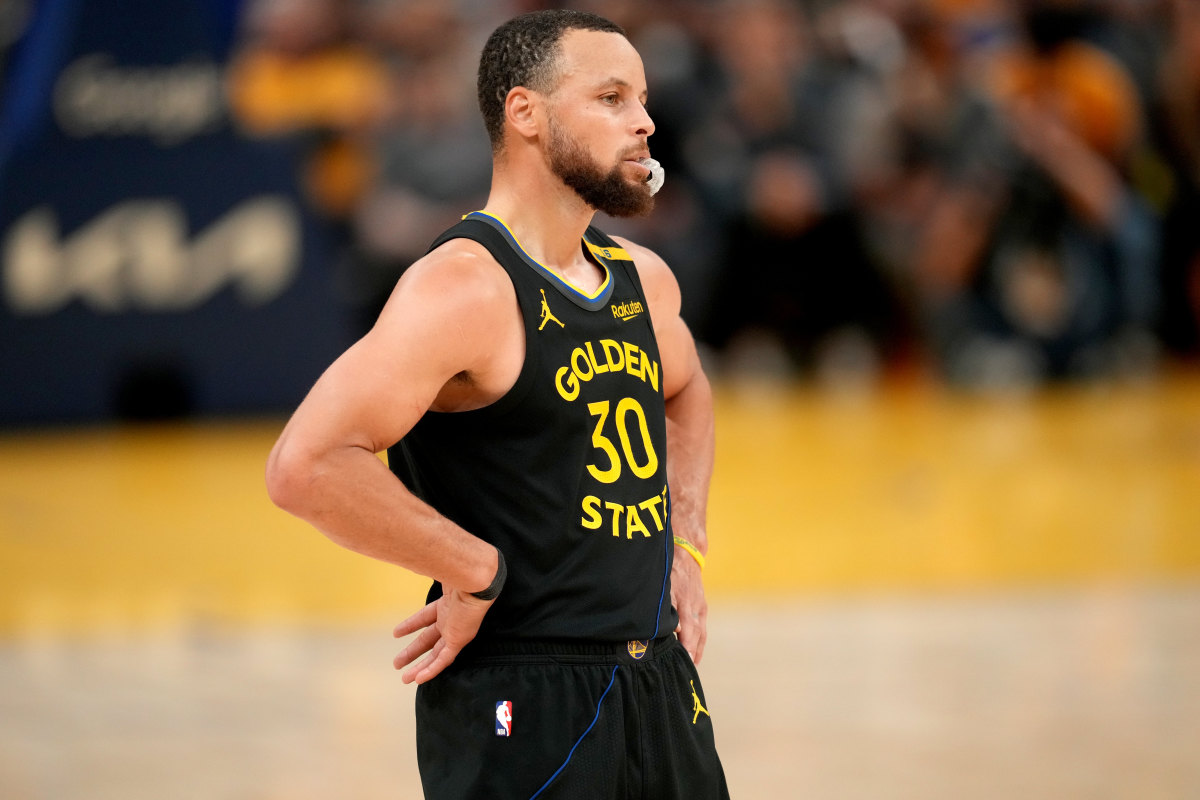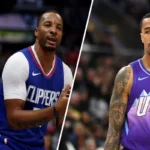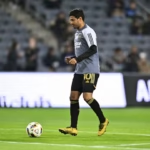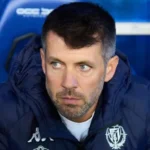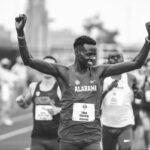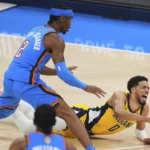The Golden State Warriors are facing a difficult reality early in the second round of the NBA playoffs. Superstar guard Stephen Curry is sidelined with a left hamstring strain, an injury he suffered in Tuesday’s Game 1 of their series against the Minnesota Timberwolves.
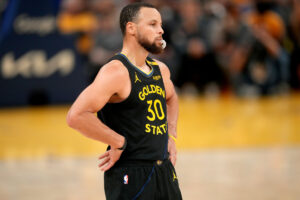
While the team initially soaked in the victory from that opening game, the news on Curry’s injury confirms he is expected to miss at least a week, forcing the Warriors to confront the challenging task of competing without their indispensable leader.
Injury Confirmed: Curry Out at Least a Week
The diagnosis confirmed expectations: Stephen Curry sustained a left hamstring strain in the series opener against the Timberwolves. The team has announced that he will miss at least a week as he begins his recovery. This timeframe ensures he will be out for Thursday’s Game 2 and likely for Game 3 (May 11 in San Francisco) and potentially Game 4 (May 13 in San Francisco) as well, placing the Warriors at a significant disadvantage early in this critical playoff series.
Curry’s Indispensable Impact
Stephen Curry’s importance to the Golden State Warriors cannot be overstated. Head coach Steve Kerr highlighted his centrality, likening him to franchise icons like Michael Jordan in Chicago and Tim Duncan in San Antonio, stating unequivocally, “None of it happens without Steph.
And everybody knows that. The whole team understands that.” Curry’s unique offensive impact – his unparalleled shooting range, gravity that warps defenses, dynamic off-ball movement, and timely playmaking – is the engine that drives the Warriors’ offense. His absence creates a void that is exceptionally difficult for any single player, or even a combination of players, to fill.
A Different Challenge Than Years Past
Playing without Stephen Curry in the playoffs isn’t entirely unprecedented for the Warriors, but the current situation differs significantly from past instances. In previous successful playoff runs where Curry missed time, the team could rely on other bona fide superstars like Klay Thompson (in his prime) and Kevin Durant to carry the offensive load and lead the team.
Those days are “long gone,” as acknowledged in the original report. The current Warriors roster features an older core, and even with Curry, the team had been described as “piecing things together.” Navigating a tough playoff series without their primary offensive engine is a taller task for this iteration of the Warriors compared to past championship-contending squads.
Increased Offensive Reliance on Jimmy Butler
With Stephen Curry sidelined, the Golden State Warriors will inevitably increase the offensive burden placed upon Jimmy Butler, who was acquired at the trade deadline. Coach Steve Kerr confirmed this strategic shift, stating the team will “absolutely going to rely on Jimmy like we have, when Steph has been off the floor the last couple months.”
Kerr mentioned the coaching staff had studied Butler’s time in Miami, where he often served as an offensive hub, and they have been running “everything through Jimmy in those moments” when Curry is not on the court. Butler’s offensive versatility, ability to create his own shot, and leadership make him the natural candidate to shoulder a larger scoring and playmaking responsibility, although Kerr cautioned they “can’t just rely on him” alone.
The Veteran Core and Role Players Must Step Up
Beyond Jimmy Butler, the Warriors will need increased contributions from their other veteran core players, such as Draymond Green, and the rest of the supporting cast. These players will need to step up their offensive game, potentially taking on expanded roles in scoring and shot creation, and adapting their game plans to a different offensive flow without Curry’s constant threat and ball-handling. The ability of these players to consistently contribute offensively will be crucial in keeping the Warriors competitive.
Draymond Green’s Game 1 Offensive Spark
In the Game 1 victory before Curry’s injury was fully assessed, Draymond Green provided an unexpected offensive spark, hitting four three-pointers, something he hadn’t done in a playoff game since 2017.
Green acknowledged after Game 1 that things get tougher if they have to go forward without Steph, but maintained that the team’s “same mission” is to keep winning games. While his offensive outbursts are not always consistent, the Warriors will need reliable contributions from players like Green to stretch the floor and create opportunities.
Adapting Game Plans and Lineups
Playing without a player as central as Stephen Curry requires significant strategic adjustments. Coach Steve Kerr indicated that the team was immediately discussing how they would approach the upcoming games, evaluating potential lineup changes and adapting their game plans.
Despite the difficulty, Kerr expressed confidence in the team’s ability to adapt, drawing on past playoff experiences where they have had to make similar adjustments due to game plan needs, injuries, or lineup changes. He stated, “We just have to adapt. And we’ve done this before, and we’re confident we can do this again.”
Strong Defense and Physicality Are Key
Without Stephen Curry’s primary offensive engine, the Golden State Warriors’ ability to win games will lean even more heavily on their defensive performance and physicality. Since acquiring Jimmy Butler, the Warriors’ defense has reportedly been tops in the league. Their physicality, particularly on the boards as demonstrated in Game 1, will be crucial in grinding out wins.
Against a tough opponent like the Timberwolves, controlling the glass and playing disciplined, high-effort defense will be paramount to compensating for any drop-off in offensive production. Winning lower-scoring, defensive battles might be the team’s best path forward in Curry’s absence.
The Fouling Debate in Game 1
The physicality displayed in Game 1 did not go unnoticed, leading to comments about officiating. Timberwolves coach Chris Finch claimed that his center, Rudy Gobert, was roughed up too much by the Warriors’ physicality and stated he sent tapes to the league office as evidence.
Coach Steve Kerr acknowledged the physical nature of playoff basketball but offered his own perspective, stating that “Everybody’s fouling each other” and that referees have a very hard job in allowing more physicality in the postseason. Kerr added that he also had his own complaints, believing that his star player, Stephen Curry before the injury, faced multiple uncalled fouls while being guarded. This debate highlights the intense physical nature typical of NBA playoffs games.
Timeline for a Potential Return
The hope for the Golden State Warriors is that Stephen Curry can return to action before their playoff run potentially ends. The “at least a week” timeline confirms he will miss multiple games. There is a slim hope that he might be able to return before a potential Game 6, scheduled for May 18 in San Francisco (12 days after the injury).
A return for Game 5 (May 14 in Minneapolis) seems less likely, described as “cutting it very close.” For any potential return later in the series to be meaningful, the Warriors will need to win games without him to keep the series alive until he is medically cleared and ready to play. He is confirmed to be on the bench for Thursday’s Game 2, rather than flying back to San Francisco initially.
Fighting for Survival Without Their Star
The Golden State Warriors face a significant test of their resilience and depth in the second round of the NBA playoffs, tasked with navigating a series against the Minnesota Timberwolves without their indispensable superstar, Stephen Curry. Sidelined by a hamstring injury for at least a week, the Warriors will need increased offensive contributions, particularly from Jimmy Butler handling a higher usage role, and stepped-up play from their veteran core and supporting cast.
Adapting game plans and relying heavily on their strong defense and physicality will be critical. The team is fighting to keep their season alive until Stephen Curry can potentially return later in the series, making each upcoming game a crucial battle for survival in the NBA playoffs.


